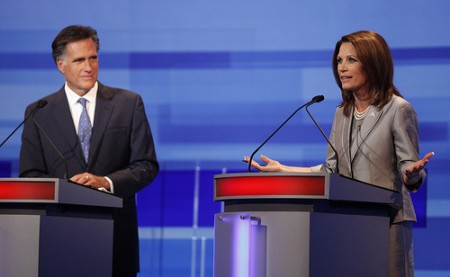
The next American presidential election is only 13 months away, and the campaign season is getting close to full-swing. Last night in Hanover, New Hampshire, the candidates for the Republican nomination met for what is already their seventh debate, and there are signs, in his energetic push for the Jobs Bill, that ‘campaign Obama’ may be about to emerge from his presidential shell. At this stage, all eyes are understandably focused on the economy, as it is widely believed that the election will be decided by what happens with unemployment. In September, the economy created 103,000 non-farm jobs, edging the official rate up to 9.1 percent. Looming ever more ominously on the horizon, however, is the much bigger problem of the national debt. At last count, total outstanding public debt is now at 99 pct of GDP, the highest level since the heyday of the Marshall Plan.
As James Traub, for Foreign Policy, has pointed out, this focus on economic matters has meant less direct attention to foreign affairs, particularly by the Republican candidates. According to Traub’s article, which runs through the foreign policy views (and lack thereof) of the respective candidates: Mitt Romney has been the most specific, though worryingly inconsistent — saying both that he would ‘bring the troops home’ as soon as possible but also defer to David Petraeus, who disagrees with that notion; Jon Huntsman, the former Ambassador to China, wants to reduce the number of American troops abroad, to “focus more on national building at home”, but has apparently made himself unelectable by saying so; Herman Cain “proudly doesn’t know anything about foreign policy”; and, for Rick Perry, the key issue seems to be whether or not to invade Mexico.
This inattention to foreign policy by the GOP — though probably inevitable, at least at this stage — is actually quite ironic. As we have seen over the past year, the president tends to have considerably more control over foreign affairs than over domestic ones. Compared with the ‘surgical’ precision of the instruments of national defense and diplomacy, the levers of fiscal and monetary policy are relatively crude. Another irony of focusing so much on the economy is that the two big economic issues, jobs and the national debt, are driven largely by international phenomena that foreign policy can importantly shape — perhaps now more than ever before .
Everyone has been hearing for years about outsourcing, but one of the biggest threats to American jobs at present, as Obama highlighted the other day, is the widening debt crisis in Europe. And, of course, some of the biggest drivers of the national debt have been the wars in Iraq and Afghanistan and the rest of the Pentagon’s herd of sacred cows, as this figure (on total spending) and this figure (on discretionary spending) indicate.
To their credit, Romney and Huntsman have recently begun to talk about the international dimensions of America’s economic woes, by promising to punish China for currency manipulation — though it’s unclear what impact this would have on domestic employment, as it could trigger a retaliatory ‘trade war.’ Ron Paul, Michelle Bachman and Rick Perry sometimes strike isolationist tones that imply cutbacks in military commitments abroad, which would at least help from a budgetary perspective. But while these statements play well with the Tea Party, they quickly alienate the Republican base and so tend to invite hasty retractions.
In any case, what a candidate says about foreign policy may be a poor guide to what he or she would actually do as president. As Traub writes, “candidates ask themselves, in effect, “What kind of foreign policy would a person like me have?” … Bill Clinton thought he was a human rights-driven idealist until he found out how hard it is to do the right thing; Bush thought he was a hardheaded realist until the 9/11 attacks turned him into a true-believing democracy promoter.” And it shouldn’t be forgotten that Obama himself came into office promising, among other things, to close Guantanamo, put an end to military commissions, and establish transparency standards for military contractors (though a second term would give him a chance to put things right).
In the end, we may just have to wait and see, Traub tells us, because at this stage “who they are probably matters more than what they think, or what they think they think.”

